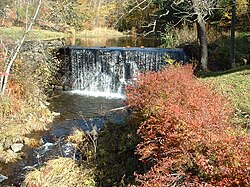Heath, Massachusetts
| Heath, Massachusetts | ||
|---|---|---|
| Town | ||

Dell Dam in autumn
|
||
|
||
 Location in Franklin County in Massachusetts |
||
| Coordinates: 42°40′24″N 72°49′20″W / 42.67333°N 72.82222°WCoordinates: 42°40′24″N 72°49′20″W / 42.67333°N 72.82222°W | ||
| Country | United States | |
| State | Massachusetts | |
| County | Franklin | |
| Settled | 1765 | |
| Incorporated | 1785 | |
| Government | ||
| • Type | Open town meeting | |
| Area | ||
| • Total | 24.9 sq mi (64.5 km2) | |
| • Land | 24.9 sq mi (64.5 km2) | |
| • Water | 0.0 sq mi (0.1 km2) | |
| Elevation | 1,680 ft (512 m) | |
| Population (2010) | ||
| • Total | 706 | |
| • Density | 28/sq mi (11/km2) | |
| Time zone | Eastern (UTC-5) | |
| • Summer (DST) | Eastern (UTC-4) | |
| ZIP code | 01346 | |
| Area code(s) | 413 | |
| FIPS code | 25-29650 | |
| GNIS feature ID | 0618167 | |
| Website | www |
|
Heath is a town in Franklin County, Massachusetts, United States. The population was 706 at the 2010 census. It is part of the Springfield, Massachusetts Metropolitan Statistical Area.
Heath was first settled in 1765 as a part of Charlemont. The town, as well as neighboring Rowe, separated, and Heath was officially incorporated in 1785, just a few days after its new neighbor. The town is named after William Heath, Major General of Massachusetts and Brigadier General in the national army during the American Revolution.
General Heath had been the commanding officer and friend of Col. Hugh Maxwell, a local citizen who suggested the town be named in his honor. In 1784 Maxwell, who was severely wounded at the Battle of Bunker Hill by a bullet through his shoulder, was chosen to represent Heath at the General Court in Boston and obtain a division of the town from Charlemont. Accordingly, the new town was incorporated on February 14, 1785.
Chloe Maxwell, daughter of Col. Maxwell, was married to prominent local landowner and state legislator abolitionist Roger Leavitt. Their son was the Congregational minister, lawyer, social reformer, editor and fervent abolitionist Rev. Joshua Leavitt, who after his graduation from Yale College was the first lawyer to practice in Heath. (Rev. Leavitt soon gave up law for the ministry, training at Yale Theological Seminary and settling in Stratford, Connecticut, before decamping for New York City and a career that included the editorship of The Emancipator.) Members of the Leavitt family of Heath and Charlemont provided stops on the Underground Railroad, and in some cases sheltered slaves like Basil Dorsey who were fleeing the South.
...
Wikipedia

